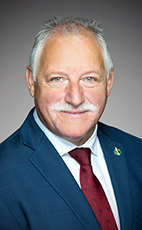Madam Speaker, I will be splitting my time with the member for Brampton South.
The bill before is an extremely important one. We have a health crisis, and we need to respond quickly. Our government, with the support of many members in the House, is doing just that.
I would like to begin by extending my sympathy to all those who have lost a friend, neighbour, family member, or co-worker through this crisis.
In the past eight years in Nova Scotia alone there have been over 800 overdoses, and half of those have been due to the use of opioids. This is the situation in Nova Scotia, but the situation is much greater in other provinces. For example, in British Columbia, 900 people lost their lives through overdose in the last year, which is 80% more than in 2015. At a national level, overdoses now outnumber the deaths due to motor vehicle accidents. This gives us an interesting comparison, and shows how sad this crisis is.
This crisis has no boundaries. There is no age, gender, or income factor. This is an addiction; it is an illness. All governments need to respond to this crisis. We have to find the root causes and then find solutions through the most current evidenced-based policies to support that. Addictions can take hold of someone trying to cope with physical or emotional pain.
The tragic thing about fentanyl is that the drug is so powerful, a minuscule amount can have dramatic effects and even cause death. As little as 30 grams, enough to fill a regular envelope, can cause as many as 15,000 people to die of an overdose.
That is why our government and all members of the House must pass a bill quickly, because every moment counts.
This legislation would roll back changes made by the previous government, the so-called Respect for Communities Act. That legislation added an unnecessary burden on provinces, local governments, and communities in applying for an exception under the Controlled Drugs and Substances Act to establish a safe consumption site. Bill C-37 would accomplish this by simplifying and streamlining the previous process and its 26 application criteria. That is why only three sites in the last two years have been established under those criteria.
Our government is applying the wisdom of the Supreme Court of Canada, which indicated five important factors: one, evidence on the impact of such facilities on crime rates; two, local communities indicating that there is a need for those types of sites; three, establishing regulatory structures and making sure they are in place to support the sites; four, having the necessary resources; and, five, having communities express support or opposition. That is what is important and what the bill would provide. In addition, whichever applications are denied or approved, the decisions would be made public. It is important that they be public.
The fact is that supervised consumption sites save lives. That is the important thing here: they save lives. The Vancouver sites help integrate people with addiction problems into the health system in an environment where they are not judged or stigmatized.
Harm reduction is not our government's only strategy. Our government has made it clear that we will invest $5 billion in mental health as part of the health agreement.
Prior to 2006, the Government of Canada had a federal drug strategy that had a balanced approach between public health and public safety that included the four key pillars: prevention, treatment, enforcement, and harm reduction. The previous government removed harm reduction as a pillar in our national drug strategy. This was unfortunate, because evidence has shown time and time again that harm reduction strategies are needed to ensure good public health outcomes.
As part of this government's commitment to evidence-based policy-making, the Minister of Health has reinstated harm reduction as a pillar of our strategy.
Along with harm reduction, our government has also eased access to the life-saving overdose treatment naloxone. Canadians can now access this drug antidote without a prescription and we have ensured emergency supplies are available for all Canadians.
In terms of enforcement, the RCMP has been diligently working to try to stop the flow of fentanyl. An agreement was recently reached with China on this issue. Furthermore, under this legislation, the Canada Border Services Agency would have more flexibility to inspect suspicious mail which it believes may contain prohibited goods. This measure would only apply to incoming international mail from areas of the world where prevalence of illicit drugs is greater.
In closing, I would like to commend the Minister of Health for her hard work in combatting this crisis and working toward a solution, and her leadership in bringing this legislation forward. I also want to thank members in all parties in the House for their contribution to this debate, as well as the NDP, the Bloc, and the Green Party that have directly supported this bill.

